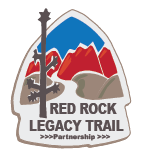Red Rock Canyon Bike Path Planning Details
- In most places, the path will be paved like a road, but with red or brown colored pavement to blend in with the background.
- Lower places that go through washes will be made out of concrete to be stronger for flash floods.
- The path will be on the outside of the curve of 159, away from the city and toward the cliffs.
- It will start at Desert Foothills Drive in Summerlin and end at the detention basin on SR 160.
- The bike path will go through two tunnels. One tunnel will go under the road through the wash between Calico Basin and the Red Rock Canyon visitor’s center entrance, and the other tunnel will go under the road throuh the wash between the Gypsum mine and Avery Street.
- The path will be approximately 1/4 mile from the road.
- It will follow the general path of SR 159, but will not be as straight as the road.
- It will follow the natural curves and contours of the land.
- It will be built around hills and in many places, out of sight of the road to provide a more natural experience, with the exception of one two-mile section between the entrance and exit of the scenic loop where it will be adjacent to the road. This had to be done because of the extreme topography of the area. The wash was too deep and the grades too steep to put the path anywhere besides the road. It will be next to the road, but separated by about a foot.
- It will look like a miniature colored road with two small lanes, each one 5 feet wide, for travel in opposite directions, separated by a dotted yellow line in the middle.
- We chose a colored asphalt (pavement) surface because it was better than hard-packed granite for bicyclists and strollers and better than concrete for runners.
- There will be trailheads with parking areas and facilities at the ends of the path and along the way.
- Both ends of the bike path will have a five-mile loop path in addition to the extended path so people can do shorter rides around the loops if they don’t want to do the longer route.
- The natural desert landscape will be preserved along the trail and matched at the trailheads with additional native species of trees and plants.
- A budget will be set ulp for maintenance of the path with a special path-sized street sweelper.
- Most of the path will be ADA accessible. And all parking and trailheads will be ADA compliant.
- the path will have gradual grades where possible and switchbacks to lessen the grade where the land would otherwise be steeper. This means, instead of going straight up a hill, the path will go around it or go back and forth over it in a wide zigzag.
- the path is not designed for fast road bikers or teams/group rides. The bike lanes on the road were designed for this purpose and will not be affected or taken away when the bike path is built. Competitive cyclists will be encouraged to stay on the bike lane adjacent the road, except for when they want to share a leisurely 15 mph on the path with other users.

